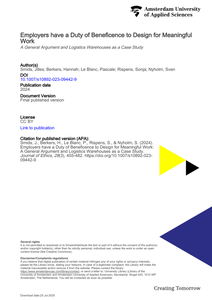Artificial intelligence-driven technology increasingly shapes work practices and, accordingly, employees’ opportunities for meaningful work (MW). In our paper, we identify five dimensions of MW: pursuing a purpose, social relationships, exercising skills and self-development, autonomy, self-esteem and recognition. Because MW is an important good, lacking opportunities for MW is a serious disadvantage. Therefore, we need to know to what extent employers have a duty to provide this good to their employees. We hold that employers have a duty of beneficence to design for opportunities for MW when implementing AI-technology in the workplace. We argue that this duty of beneficence is supported by the three major ethical theories, namely, Kantian ethics, consequentialism, and virtue ethics. We defend this duty against two objections, including the view that it is incompatible with the shareholder theory of the firm. We then employ the five dimensions of MW as our analytical lens to investigate how AI-based technological innovation in logistic warehouses has an impact, both positively and negatively, on MW, and illustrate that design for MW is feasible. We further support this practical feasibility with the help of insights from organizational psychology. We end by discussing how AI-based technology has an impact both on meaningful work (often seen as an aspirational goal) and decent work (generally seen as a matter of justice). Accordingly, ethical reflection on meaningful and decent work should become more integrated to do justice to how AI-technology inevitably shapes both simultaneously.
DOCUMENT

Robots are increasingly used in a variety of work environments, but surprisingly little attention has been paid to how robots change work. In this comparative case study, we explore how robotization changed the work design of order pickers and order packers in eight logistic warehouses. We found that all warehouses robotized tasks based on technological functionality to increase efficiency, which sometimes created jobs consisting of ‘left-over tasks’. Only two warehouses used a bottom-up approach, where employees were involved in the implementation and quality of work was considered important. Although the other warehouses did not, sometimes their work design still benefitted from robotization. The positive effects we identified are reduced physical and cognitive demands and opportunities for upskilling. Warehouses that lack attention to the quality of work may risk ending up with the negative effects for employees, such as simplification and intensification of work, and reduced autonomy. We propose that understanding the consequences of robots on work design supports HR professionals to help managing this transition by both giving relevant input on a strategic level about the importance of work design and advocating for employees and their involvement.
DOCUMENT

This research aims to contribute to a better understanding of strategic collaborations between work-integration social enterprises (WISEs) and for-profit enterprises (FPEs) with the joint objective to improve labour market opportunities for vulnerable groups. We find that most collaborations strive towards integration or transformation in order to make more social impact.
LINK
The IMPULS-2020 project DIGIREAL (BUas, 2021) aims to significantly strengthen BUAS’ Research and Development (R&D) on Digital Realities for the benefit of innovation in our sectoral industries. The project will furthermore help BUas to position itself in the emerging innovation ecosystems on Human Interaction, AI and Interactive Technologies. The pandemic has had a tremendous negative impact on BUas industrial sectors of research: Tourism, Leisure and Events, Hospitality and Facility, Built Environment and Logistics. Our partner industries are in great need of innovative responses to the crises. Data, AI combined with Interactive and Immersive Technologies (Games, VR/AR) can provide a partial solution, in line with the key-enabling technologies of the Smart Industry agenda. DIGIREAL builds upon our well-established expertise and capacity in entertainment and serious games and digital media (VR/AR). It furthermore strengthens our initial plans to venture into Data and Applied AI. Digital Realities offer great opportunities for sectoral industry research and innovation, such as experience measurement in Leisure and Hospitality, data-driven decision-making for (sustainable) tourism, geo-data simulations for Logistics and Digital Twins for Spatial Planning. Although BUas already has successful R&D projects in these areas, the synergy can and should significantly be improved. We propose a coherent one-year Impuls funded package to develop (in 2021): 1. A multi-year R&D program on Digital Realities, that leads to, 2. Strategic R&D proposals, in particular a SPRONG/sleuteltechnologie proposal; 3. Partnerships in the regional and national innovation ecosystem, in particular Mind Labs and Data Development Lab (DDL); 4. A shared Digital Realities Lab infrastructure, in particular hardware/software/peopleware for Augmented and Mixed Reality; 5. Leadership, support and operational capacity to achieve and support the above. The proposal presents a work program and management structure, with external partners in an advisory role.